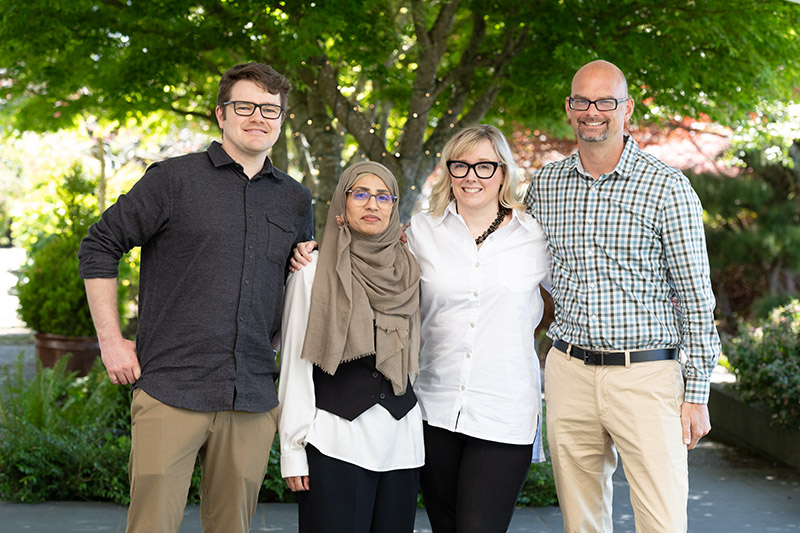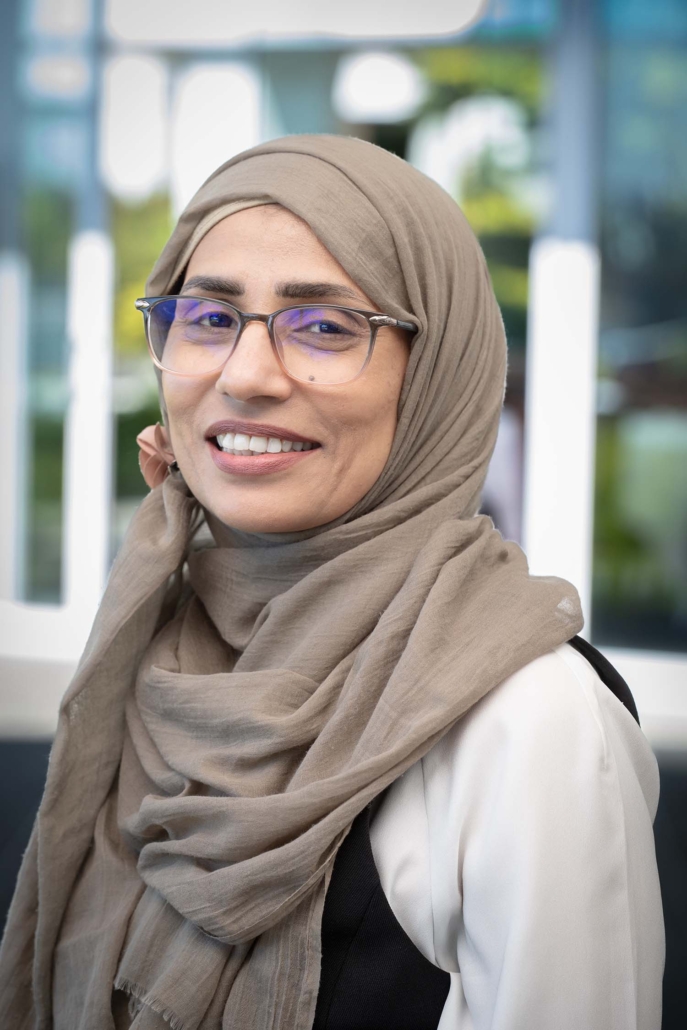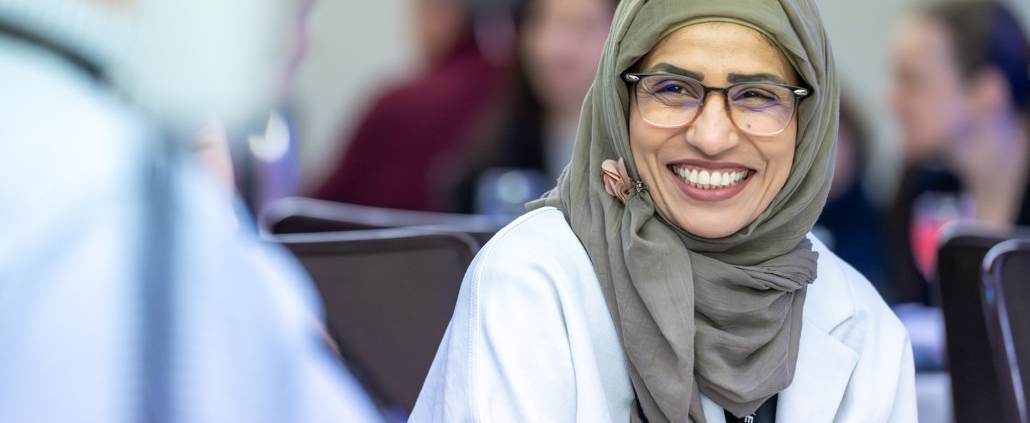Member Profile: Bushra Waheed – Uncommon Knowledge
A self-professed lifelong learner, Bushra Waheed has four post-secondary degrees—three in engineering and one in business. Her next growth opportunity? She’s vice president of the newly created BC Energy Regulator PEA chapter
Words: Jessica Natale Woollard
Photos: Aaron Lutsch
Safety is paramount in the energy industry. The consequences of an incident—an oil spill, for example—could be detrimental to human lives and the environment.
You need the right people in place to ensure the safe functioning of energy infrastructure.
In B.C., the integrity of infrastructure assets, such as pipelines and facilities and the regulation of companies who operate them, lie in the capable hands of members of the Professional Employees Association.
These engineers, geoscientists and geologists work for the British Columbia Energy Regulator (BCER), which, until February 2023, operated as the BC Oil and Gas Commission. Thirty-five members are stationed around the province, including seven at the crown corporation’s headquarters in remote Fort St. John in B.C.’s north-east, an hour’s drive from the Alberta border.
The collective expertise of PEA members across the province ensures energy infrastructure is operated safely, to protect people and the environment.
“The BCER stands for responsible regulation of energy activity in BCER,” explains Bushra Waheed, a senior integrity auditor at BCER and vice president of the PEA’s BCER chapter. “My work verifies the effectiveness of safety management processes and procedures for managing the risks associated with the energy operation —to the environment, to the public, to the property.”
Waheed, who has been with BCER since 2011, has become adept at explaining her complex role to people outside the sector:
“The purpose of a pipeline is to transport fluid from point A to point B,” she describes. “Integrity is maintained if a fluid stays inside the pipeline. What is under our control is to assure that the resources that run through the pipelines and the energy infrastructure—the veins and the arteries of the energy system—run properly with minimal damage.”
Every year, BCER conducts 24 integrity management audits of the 60 to 100 companies that operate and maintain pipeline infrastructure in the province. Each company is audited on a five-year cycle. A typical audit will take Waheed three to four hours to ensure auditees are adhering to the province’s safety standards and regulatory requirements. However, pre- and post-audit activities—such as planning, research, reviewing information, report writing, following up on corrective actions to resolve the audit findings, and analysis of data—take months, depending on the scope of the audit and who is involved.

BC Energy Regulator History
“Audits require attention to detail and a keen eye,” Waheed explains. “My strength is in ensuring all the required areas for the audit are fully discussed and evaluated during the allocated time and ensuring auditing is a worthwhile experience for us and the auditee from process improvement perspective.”
To balance this technical and cerebral work, Waheed ensures her workday includes activities to nurture mind, body and soul—a good breakfast, prayer, meditation, and a walk or run at lunch time while listening to her favourite podcast, Blinkist, which summarizes key insights from non-fiction.
For the last 13 years, Waheed’s focus has been primarily on pipeline and facility infrastructure, but, as the energy industry begins its transition to clean energy, the work is changing.
“We are very dependent on fossil fuels at the moment, but there are other options that are being looked at,” she explains, citing hydrogen, geothermal and LNG as potential energy sources for the province.
“We are not the policymakers; we are policy takers,” she continues, adding that BCER follows the provincial government’s climate change objectives, which include the development of non-carbon fuel—hence BCER’s rebranding to a name inclusive of new energy sources.
Waheed welcomes the changes coming; they present an opportunity for her to learn more. She thrives on lifelong learning, embracing both informal and formal education opportunities. Over three decades, she earned four post-secondary degrees, including two master’s degrees and a doctorate. Waheed began her formal education at the University of Engineering and Technology in her native country of Pakistan, graduating with an undergraduate degree in civil engineering in 1993. Next, she earned her first master’s degree in environmental engineering at the University of Sydney in Australia in 1996.
Growth is not just the work you do, it’s your personal journey as well.
In 2000, Waheed relocated to Newfoundland where her husband was getting a PhD at Memorial University. The pair pursued work opportunities first in St. John, then Ottawa and finally Kelowna, where they currently live with their two university-aged children. Prior to joining BCER in Kelowna, Waheed worked for SNC-Lavalin (now AtkinsRéalis), at the National Research Council, and as an engineering consultant.
Following in her husband’s footsteps, she enrolled in a PhD program at Memorial University, completing her doctorate in environmental engineering in sustainable decision making in 2011, the year she began at BCER in an entry-level position.
“I started at the lowest level, even though I was overqualified, because it was a new sector for me,” she explains. “It was a good opportunity to learn and to grow as a professional.”
Within a year, Waheed had moved into integrity management and evolved into her current role as senior integrity auditor, a role she enjoys to this day because of its blend of technical engineering and systems management skills.
“I know that the work I do is important,” she says. “I’m given interesting projects to work on, and I get to keep learning. Growth is not just the work you do, it’s your personal journey as well.”
Ten years after finishing her PhD, Waheed was back in school, this time completing an MBA through the Australian Institute of Business. She graduated with her fourth degree in 2024.
The MBA “gave me a different perspective from engineering, which is technical, difficult and about problem solving,” she explains. “The hardest thing of all is dealing with people. To learn human resources are the most significant asset of any company. Learning what people value and making sure that things are done right for people is an area I’m very interested in.”

The BCER Executive (from left to right): Sean Babulic, Bushra Waheed, PEA Labour Relations Officer Rhiannon Bray, and Stu Venables.
In 2023, Waheed embraced another learning opportunity by taking on the role of vice president of the PEA’s BCER chapter.
“At this time of my career, I strongly felt that it’s time to give back and to work for the people,” she reflects. “My time will be best served if I can contribute and advocate for the rights of our members.”
The BCER chapter was created in October 2023, eight months after the BCER name and mandate change. Previously, these members had been part of the Government Licensed Professionals (GLP) chapter, and although they had their own collective agreement, their needs—often very different than those of fellow GLP members—were represented by a single person. The BCER voice would benefit from being louder, to better meet the varied requirements of engineers, geoscientists and geologists in the energy industry.
“I think being our own chapter provides us with more liberty and focused vision,” Waheed notes.
She will no doubt apply her management systems and engineering thinking to the role. “When you’re an engineer with a systems-thinking approach, you know how to find more informed and rational solutions through a structured approach to align with organizational goals and strategies,” she says.
“There’s a lot of potential [in this new chapter]. I want to inculcate a culture of leadership, so the members have their professional needs met,” she continues. “I want to make a positive change wherever I go, and that’s what I intend to do.”


